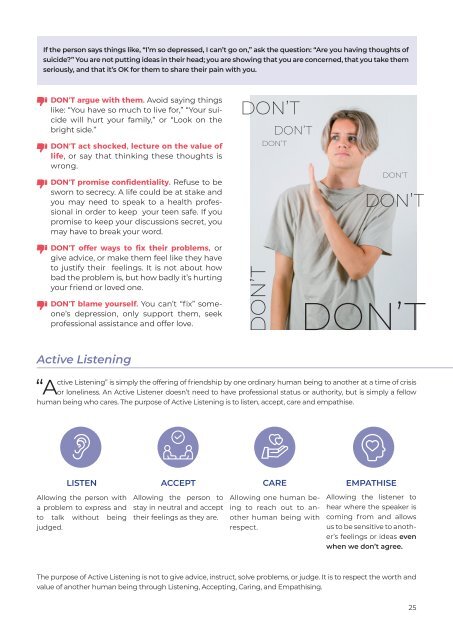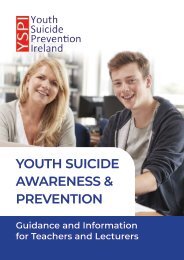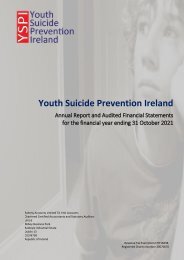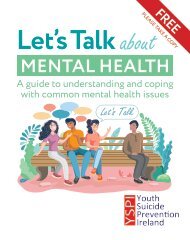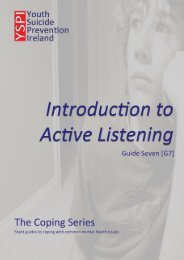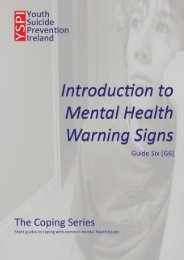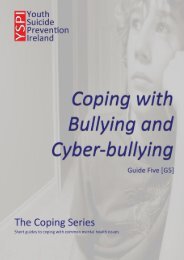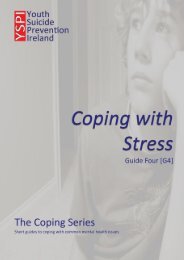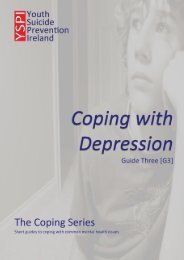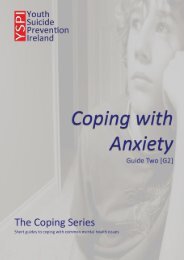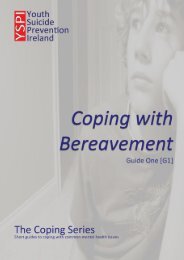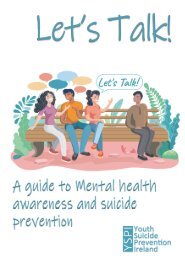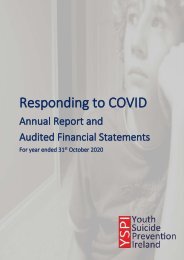What are they thinking? - YSPI Parents Handbook
A Parents Handbook to youth mental health and suicide prevention, now in it's 10th edition. Topics covered include: * Introduction to youth mental health awareness * Awareness of mental health risk factors * Recognising the symptoms of mental health issues * Helping someone with mental health issues * Understanding the dangers: Cyber-bullying Online Dangers Locked-away Syndrome * Supporting and developing coping strategies * Warnings signs of suicidal thoughts * Suicide Prevention and intervention * How to help and get help
A Parents Handbook to youth mental health and suicide prevention, now in it's 10th edition.
Topics covered include:
* Introduction to youth mental health awareness
* Awareness of mental health risk factors
* Recognising the symptoms of mental health issues
* Helping someone with mental health issues
* Understanding the dangers:
Cyber-bullying
Online Dangers
Locked-away Syndrome
* Supporting and developing coping strategies
* Warnings signs of suicidal thoughts
* Suicide Prevention and intervention
* How to help and get help
You also want an ePaper? Increase the reach of your titles
YUMPU automatically turns print PDFs into web optimized ePapers that Google loves.
If the person says things like, “I’m so depressed, I can’t go on,” ask the question: “Are you having thoughts of<br />
suicide?” You <strong>are</strong> not putting ideas in their head; you <strong>are</strong> showing that you <strong>are</strong> concerned, that you take them<br />
seriously, and that it’s OK for them to sh<strong>are</strong> their pain with you.<br />
DON’T argue with them. Avoid saying things<br />
like: “You have so much to live for,” “Your suicide<br />
will hurt your family,” or “Look on the<br />
bright side.”<br />
DON’T act shocked, lecture on the value of<br />
life, or say that <strong>thinking</strong> these thoughts is<br />
wrong.<br />
DON’T promise confidentiality. Refuse to be<br />
sworn to secrecy. A life could be at stake and<br />
you may need to speak to a health professional<br />
in order to keep your teen safe. If you<br />
promise to keep your discussions secret, you<br />
may have to break your word.<br />
DON’T offer ways to fix their problems, or<br />
give advice, or make them feel like <strong>they</strong> have<br />
to justify their feelings. It is not about how<br />
bad the problem is, but how badly it’s hurting<br />
your friend or loved one.<br />
DON’T blame yourself. You can’t “fix” someone’s<br />
depression, only support them, seek<br />
professional assistance and offer love.<br />
Active Listening<br />
ctive Listening” is simply the offering of friendship by one ordinary human being to another at a time of crisis<br />
“Aor loneliness. An Active Listener doesn’t need to have professional status or authority, but is simply a fellow<br />
human being who c<strong>are</strong>s. The purpose of Active Listening is to listen, accept, c<strong>are</strong> and empathise.<br />
LISTEN<br />
ACCEPT<br />
CARE<br />
EMPATHISE<br />
Allowing the person with<br />
a problem to express and<br />
to talk without being<br />
judged.<br />
Allowing the person to<br />
stay in neutral and accept<br />
their feelings as <strong>they</strong> <strong>are</strong>.<br />
Allowing one human being<br />
to reach out to another<br />
human being with<br />
respect.<br />
Allowing the listener to<br />
hear where the speaker is<br />
coming from and allows<br />
us to be sensitive to another’s<br />
feelings or ideas even<br />
when we don’t agree.<br />
The purpose of Active Listening is not to give advice, instruct, solve problems, or judge. It is to respect the worth and<br />
value of another human being through Listening, Accepting, Caring, and Empathising.<br />
25


